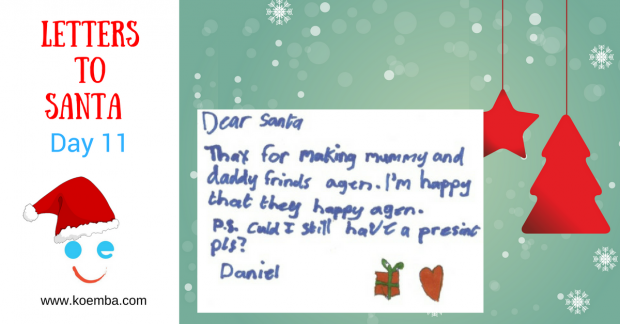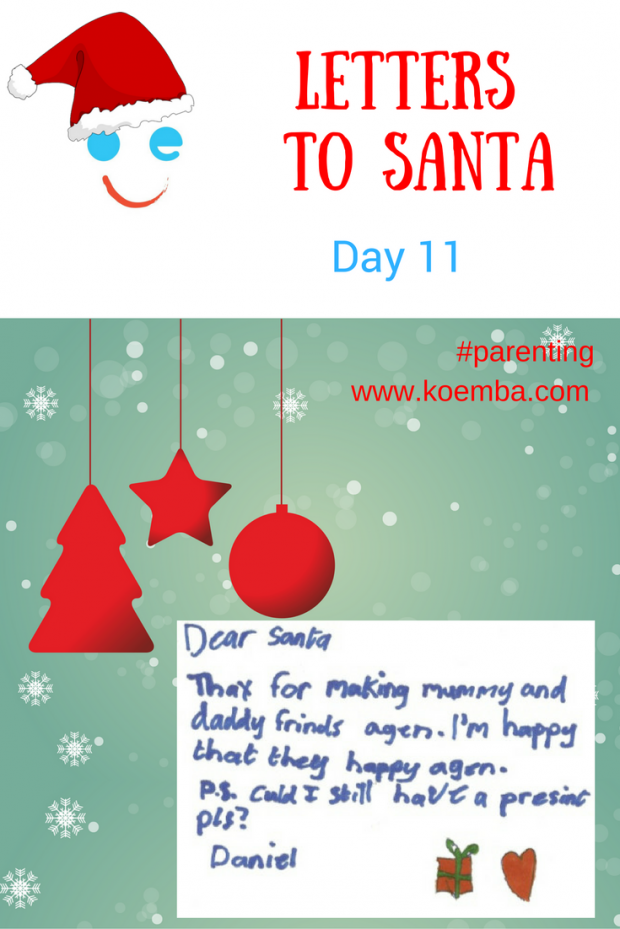
Dear Santa
Here’s another letter from Daniel. So glad his parents are sorting things out. (Maybe they read your letter about ‘When Grown Ups Fight’!)
It makes sense that it’s hard to forgive, even at Christmas, when someone has deeply hurt you. Many people are stuck in a place of anger/unforgiveness regarding an ex, their own parent, someone else, perhaps they are struggling to forgive another group of people who have injured those we love. And sometimes it’s ourselves that we find hard to forgive.
What would you like to say to parents who find it hard to forgive?
PercyPostElf
Dear PercyPostElf
It makes sense that when people hurt us, it’s hard to forgive.
What we often overlook is the cost of unforgiveness – to our physical and emotional health but we also often forget the huge price that unforgiveness can cost our children too.
Let me share with you an African tale on how to catch a monkey.
Find a tree with a very small hole in the trunk. Take a handful of peanuts and while the monkey is watching you, push the peanuts into the hole in the tree. Now move away and wait. The monkey will soon come for the peanuts. But when he puts his hand into the hole and seizes the peanuts, his fist is now too big to get out the hole. He doesn’t want to let go the peanuts – so he’s stuck. Now you can catch your monkey!
That’s what happens to us when we hold onto unforgiveness. It’s hard to forgive because we think we’re punishing the person who hurt us but actually, we are keeping ourselves stuck in one place. Sometimes we avoid forgiveness because we don’t want reconciliation with a particular person or situation. But forgiveness and reconciliation are not the same thing. We can choose to forgive, even if reconciliation isn’t desirable or advisable.
Forgiveness is choosing to let go of the ‘peanuts’ of anger and bitterness. These uncomfortable feelings are emotional termites that eat away our family’s happiness if we don’t deal with them.
‘Peace on Earth’ doesn’t just happen. Peace happens one relationship at a time. Peace happens when people choose to be peace-makers. And sometimes part of peace-making is forgiving.

Did you know that our way of living is hugely influenced by the thoughts of the past four generations and that the thoughts we think will affect the next four generations? This Christmas let’s consciously choose the emotional legacy we leave to our children, grandchildren, great-grandchildren and great, great-grandchildren.
It can be helpful to take time to reflect:
‘Is there a situation where I am finding it hard to forgive?’
‘On a scale of 0-10 what example of forgiveness am I modelling to my children?’ (0 equals holding tightly to bitter, angry and unforgiving thoughts and 10 being free of those).
This Christmas I ask parents to get the help needed to let go of unforgiveness – for their children’s sake as well as their own.
The word ‘forgiving’ is actually two words. What do I choose to give: to myself / my loved ones / that other person?
Christmas is a time a time for giving and for for-giving.
Reconciliation is not always advisable but we can choose to let go of our bitterness or anger and move forward.
Now it’s over to you – how will you choose to be a peace-maker this festive season?

Love
Santa
P.S. Check in tomorrow for my final letter this year. After that, Rudolph and I will busy with present deliveries.
P.P.S. Here are my other letters:
Day 1 What to do with Children’s ‘Great Expectations’?
Day 2 ‘Need’ or ‘Want’
Day 3 Dealing with Disappointment
Day 4 Christmas Surprises
Day 5 Three Key Questions Regarding Purchases
Day 6 No Money This Christmas
Day 7 Christmas is for Giving
Day 8 When Sad or Bad Things Happen
Day 9 When Grown Ups Fight
Day 10 An Attitude of Gratitude
Day 12 Christmas – What Really Matters


No comments yet.